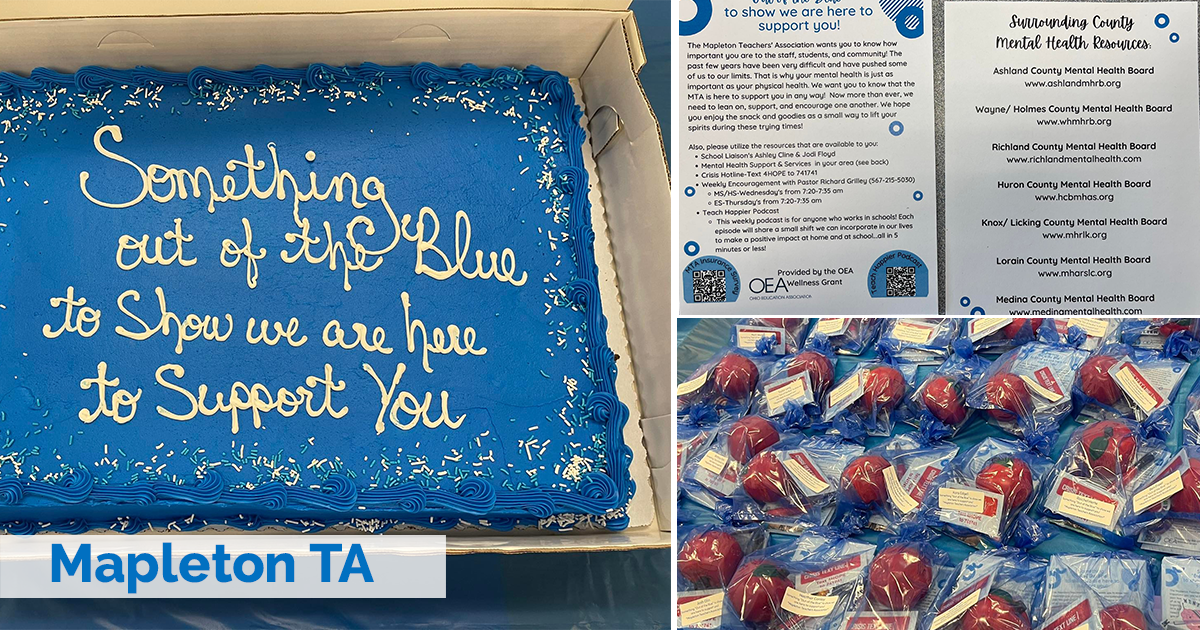Ohio Education Association celebrates STRS Board decision to restore some benefits
“The steps by the STRS Board to restore some benefits is a welcome step forward for all, which was made possible because of the improved funding level of the pension plan,” OEA President Scott DiMauro said. “It is absolutely essential to ensure reliable retirement benefits for current and future STRS retirees. The promise of a solid pension is a critical incentive to attract and retain high-quality, experienced teachers our students deserve in their classrooms.”
While celebrating the news that some benefits will be restored, OEA also acknowledges the active and retired teachers whose sacrifices over the years, including higher contributions and suspended COLA payments, have helped to return the STRS fund to a healthy position, enabling the restoration of some benefits now. “After the Great Recession, STRS was projected to run out of money, which would have been devastating for Ohio’s teachers and our public schools,” DiMauro said.
“Like many of our members, OEA’s ultimate wish is to have the COLA permanently restored when the fund is able to manage that. Unfortunately, at this point, that would add more than a $13 billion unfunded liability and would put future benefits at risk. Active teachers could again be asked to work longer, pay more and receive less in retirement, and that would not be fair,” DiMauro added. “OEA has high hopes for continued growth in the fund that will allow adjustments that benefit both active and retired teachers.”
February – March 2022 Ohio Schools
- COVER STORY: Pathways to Success – Educational Pathways program aims to set future teachers up for success.
- MAKING THE GRADE
- Ohio Paraprofessionals Honored as Ohio’s Nominees for National Recognizing Inspirational School Employees (RISE) Award
- OEA Members Recognized as Top NEA Cyber-lobbyists
- A Typical American Teacher’s Brain on Any Given School Day
- POLITICAL ACTION
- Biden Administration Delivers Results for Public Education and America in First Year
Moved recently? Contact the OEA Member Hotline to update the address on file at 1-844-OEA-Info (1-844-632-4636) or email, membership@ohea.org. Representatives are available Monday-Friday, from 8:30 a.m. to 6 p.m. | OhioSchools — Past Issues

 Oh Yes, We’re Social — Join the Conversation!
Oh Yes, We’re Social — Join the Conversation!
OEA condemns latest version of House Bill 327
[February 16, 2022] The Ohio Education Association (OEA) stands with the majority of Ohioans who believe all children deserve the opportunity to receive an honest and reflective education that empowers them to become critical thinkers and strong future leaders.
OEA is appalled by the continuing efforts of certain politicians to force through House Bill 327, which would force educators to whitewash our history and distract from the real issues facing Ohio’s schools. OEA calls on the Ohio House of Representatives to end consideration of the bill.
The revisions included in substitute HB 327, as introduced Wednesday, do nothing to address the irreparable harm this legislation would cause to Ohio’s students. And it actually makes the potential dangers to educators and administrators more confusing. The current version replaces the bill’s original and undefinable “divisive concepts” language with vague references to the 1964 Civil Rights Act, apparently requiring Ohio educators to become constitutional law experts in order to understand what the bill’s sponsors don’t want them teaching.
“Make no mistake, this latest version of HB 327 is just another exercise in smoke and mirrors by some state leaders to deflect their constitutional responsibility to fully fund all of Ohio’s public schools and provide Ohio’s children with the resources they need to succeed,” OEA President Scott DiMauro said. “The lawmakers behind this horrendous bill can dress it up anyway they want as they continue to do the bidding of a national network of extremists who are looking to control the political narrative at any cost. But this new version is just as outrageous and inexcusable as the prior version. And in some ways, it’s worse.”
OEA will continue to stand up for honesty in education and against government censorship in the classroom. Ohioans must come together and call on their elected leaders to do better for Ohio’s students.
“Educators and parents know children must have the opportunity to reckon with the mistakes of our past in order to create a better future for all of us,” DiMauro said. “Instead of anti-freedom state censorship laws, let’s work on pro-student policies like fair funding and better access to learning opportunities for all students.”
Backpack Bill would come at enormous cost
“Ohio lawmakers have a constitutional responsibility to fund Ohio’s public schools and ensure a high-quality education for all of Ohio’s kids. HB 290 would force local communities to rely even more heavily on local property taxes to fund schools for the 90 percent of Ohio children who attend public schools. There’s evidence under our current voucher system that public schools out-perform the private schools,” OEA President Scott DiMauro said, citing a Cincinnati Enquirer investigation that found nearly 90% of all voucher students do worse on state tests than students in traditional public schools in the same zip codes.
“Dumping precious resources into a universal voucher system that provides zero auditing requirements for the private schools that would rake in the taxpayers’ cash is just wrong,” DiMauro added. “This is especially true now, when Ohio finally has a public school funding system worth investing in after the adoption of the Fair School Funding Plan in the last state budget. Our lawmakers must hold up their end of the deal to fully fund that system before going off on yet another ideological misadventure with our hard-earned tax dollars. Taxpayers don’t need another ECOT-level disaster and scandal.”
Disturbingly, even with these vouchers, most families still couldn’t afford tuition at the private schools in their communities, and this exponential expansion of a vouchers system in the state would only further contribute to racial segregation in our schools. In Ohio, only about 50% of the subsidies currently being taken are being taken by non-white parents, even though the communities where about 95% of the vouchers come from are nearly 70% non-white. Only 37% of students in Lima City Schools are white, yet Temple Christian School gets $242,000 in taxpayer tuition subsidies and took 100% white students. Likewise, Lima Central Catholic takes more than 70% white students, St. Gerard and St. Charles take about 80% white students. Simply put, these private schools do not reflect the racial makeup of the communities that are forced to pay their bills.
“Ohio taxpayers can’t afford to shell out more money for voucher programs that weaken the public schools that serve the vast majority of Ohio’s kids,” DiMauro said. “We’ve been down this road before and we know it is a dead end in Ohio’s budget. When only 74% of students were eligible for government subsidized private school tuition in 2017’s SB 85, the non-partisan Ohio Legislative Service Commission estimated the cost as high as $1.2 billion. And that was with lower subsidy amounts. This bill will cost (conservatively) two or even three times that amount. Asking Ohioans to pay for that at the expense of their neighborhood public schools is irresponsible and wrong.”
OEA Hopes Court Decision on Maps Will Be Lesson Learned
“The Ohio Education Association celebrates the courage of the four State Supreme Court justices who have demonstrated their steadfast commitment to upholding the law and defending the will of the people. Ohio voters have spoken and have overwhelmingly demanded fair maps to ensure they will finally have a real voice in the Statehouse. It’s clear the state’s highest court will not let that voice be ignored any longer.
The Redistricting Commission reminds me of students I’ve had at times who spend more time creatively cheating than doing their work. Like those students, if the Redistricting Commission had put as much time into actually following the instructions of the Constitution as they did into coming up with creative ways of sidestepping the rules, they would have passed with flying colors. Moreover, if they had put as much work into following the will of the people rather than trying to get around the will of the people, we’d all have the maps we deserve.
The Commission members must understand that Ohioans have a constitutional right to choose their politicians, not the other way around, and Ohio’s broken mapmaking process must finally come to an end.
OEA looks forward to seeing the Commission’s third attempt at district maps and continues to put its faith in the State Supreme Court to ensure Ohio finally has fair maps if the Commission again fails to deliver on that promise.”
OEA applauds court decision striking down gerrymandered maps
“The Ohio Education Association (OEA) applauds the wisdom of the Ohio Supreme Court in striking down the gerrymandered maps that would have denied Ohioans a real voice in the Statehouse. This is a huge victory for Ohio voters and for Ohio schools, which are greatly impacted by the decisions of the state’s elected lawmakers.
OEA looks forward to seeing newly drawn, fair maps that will reflect the will of the two-thirds of Ohio voters who demanded an end to Ohio’s broken mapmaking process. Ohio voters deserve to choose their politicians, not the other way around. Today’s Ohio Supreme Court decision represents a major step toward making that a reality.”
December – January 2022 Ohio Schools
- COVER STORY: Stepping Up for Schools
- Educator voice key to successful school board races in Ohio
- NOTEBOOK
- OEA Local Associations Stand in solidarity for Members and Students
- MAKING THE GRADE
- Findlay Paraprofessionals Form OEA’s Newest Local Association
- OEA Members Receive Top Educator Awards from Martha Holden Jennings Foundation
Moved recently? Contact the OEA Member Hotline to update the address on file at 1-844-OEA-Info (1-844-632-4636) or email, membership@ohea.org. Representatives are available Monday-Friday, from 8:30 a.m. to 6 p.m. | OhioSchools — Past Issues

 Oh Yes, We’re Social — Join the Conversation!
Oh Yes, We’re Social — Join the Conversation!
A Typical Teacher’s Brain in an American Public High School on Any Given Day
By Julie Holderbaum, Minerva EA/OEA
Is Michael acting off today? Is he tired or just depressed? Should I pull him out into the hall and ask him if he’s okay or would it be worse to draw attention to him? Should I call home? Have his grades been slipping? Did he do the assignment that was due for me today?
 Does Becky have her cell phone in her lap? Why isn’t it in the slot with the others? Is it worth calling her out on it? Right now or later, privately? Either way, do I want to risk setting her off when she’s been doing so well and we seem to be forging a tentative relationship? Is it a big deal if she isn’t actually using it? Has she been using it and I just haven’t seen it happen?
Does Becky have her cell phone in her lap? Why isn’t it in the slot with the others? Is it worth calling her out on it? Right now or later, privately? Either way, do I want to risk setting her off when she’s been doing so well and we seem to be forging a tentative relationship? Is it a big deal if she isn’t actually using it? Has she been using it and I just haven’t seen it happen?
Why isn’t the Chromecast working? Why would it work last period and not this period? Is the internet down?
Why are we either freezing or frying? Wouldn’t it be nice to be able to regulate the heat in our own rooms?
Will I be accused of teaching divisive concepts if I lead a discussion about why we are not going to say the N word out loud when we read Of Mice and Men? Will the kids go home and tell their parents what we talked about? Do kids still do that? Do parents still ask? Is this book worth the battle it might lead to or should I just teach Fahrenheit 451 instead? Wouldn’t that be ironic? Isn’t this exactly what those who scream about CRT being taught want? For teachers to fear the repercussions and give in to temptation to just teach “safe” material instead? So that the status quo will keep on keeping on and generations of kids will continue to grow up in the dark about so much of the ugly side of America’s history? Is it worth the fight this might bring? Well, it’s obviously worth the fight, but am I mentally and emotionally up for this battle, this year especially?
More importantly, will my black students be uncomfortable if their white teacher leads this discussion in class? I know enough not to ask a Black student to speak on behalf of an entire race, but would it be okay to privately ask a Black student how they would feel about this book or that sort of discussion?
 Should I grade these 45 quick 10-point responses first or 25 longer essays? Go back and forth between the two? Am I fair to every student when I don’t grade an assignment all at once? Do I grade the first essays harder or easier than the last ones?
Should I grade these 45 quick 10-point responses first or 25 longer essays? Go back and forth between the two? Am I fair to every student when I don’t grade an assignment all at once? Do I grade the first essays harder or easier than the last ones?
Why do I feel guilty when I take points off for not capitalizing “I” or proper nouns? Why don’t they click on the squiggly lines and fix their typos/spelling/grammar errors when the computer is literally marking them for them? Why are they still making these basic mistakes when we have gone over them so many times? Do they just not care about their grades? Do they even go back and read my comments and look at why they lost points? Is this an academic issue or a motivation issue or a self-worth issue? Do we need to do more lessons on catching these mistakes or do I need to talk with them about the importance of the impression of themselves they put out into the world? Is it unfair for a student to earn a C for a grade when the content of their work is probably at a B or even an A level, but their spelling and grammar mistakes are so ubiquitous and egregious that they lose points on every assignment? Is it asking too much of them to CLICK ON THE DANG SQUIGGLY LINES?
Am I becoming the old cranky English teacher who nitpicks and loses sight of the big picture? Am I too tired for this job? Am I becoming too cynical? Are my standards too high? Haven’t I lowered them since I began teaching all those years ago, though? Should I have?
Should I work through lunch or head to the workroom? Will I feel better if I have a half-hour of adult conversation or if I get more of these papers graded? Do I need to make any hard copies of the handout for next period? Did I remember to upload the video and Google doc to Google Classroom for the kids who are absent?
Is that yelling in the hallway? What’s going on? Did one of you just call the other a bitch?
Why are the kids behaving like this this year? Is it COVID-related? Or just the stress of COVID plus all the other division and dissension in society that we are all contending with?
Does that kid who just smiled at me and said “Hey, Ms. H!” have any idea how much I needed that friendly smile right now?
 Why is the office calling down that long list of kids? Are they getting quarantined and sent home? Wait, they don’t have to stay home anymore, but they have to wear masks now, right? Will we get a list of kids who are supposed to be wearing masks for two weeks? How will I keep track of that? How many more times can I say “pull your mask up over your nose” before I start inserting curse words into that sentence?
Why is the office calling down that long list of kids? Are they getting quarantined and sent home? Wait, they don’t have to stay home anymore, but they have to wear masks now, right? Will we get a list of kids who are supposed to be wearing masks for two weeks? How will I keep track of that? How many more times can I say “pull your mask up over your nose” before I start inserting curse words into that sentence?
Do I have time to run to the bathroom between classes? Risk someone being in the single-stall teacher bathroom or go to the student bathroom further away? Is that crying in the next stall? Hey, are you all right? Do you need to talk? Which class do you have right now? Can I walk you down to the guidance office? (Will my class of freshmen be okay if I get there a little late?)
Can we settle down and get started, please? Where is your chromebook? Why isn’t it charged? Where is your charger? Why haven’t you borrowed one from the library then?
Is this email for real? Are they kidding with this? Another meeting? A new book study? This year of all years? Don’t we have enough to do? Can’t they just give us more time to plan or collaborate with each other on the ACTUAL work that needs done?
Am I getting sick or am I just exhausted? Is my throat sore from talking so much today or because I’m coming down with something? Will they be able to find a sub if I stay home tomorrow? What am I teaching tomorrow? Is it something I can adapt easily for a sub or will I need to come up with something new? How much will that impact my plans for the rest of the week? (Why can’t I be more of a Type B teacher?) Isn’t it just easier to suck it up and go to school with a cold? But what if it’s COVID?
 Is that an email from a parent? Do I have the energy to deal with that tonight? Why are they emailing me so late?
Is that an email from a parent? Do I have the energy to deal with that tonight? Why are they emailing me so late?
Where is that info about the poetry contest? When was the deadline? How did I not know until now what a great writer Jane is?
Oh no, Michael didn’t do the assignment; is it too late to call home tonight or should I wait and call from school tomorrow? Do his parents work during the day? Do they support his use of he/him pronouns? Do I need to refer to him as Michelle when I talk to them?
Why am I watching the news? Is the legislature seriously going to try to pass that? Do they have any clue how that will impact teaching and learning? Why do the people with the power to address some of the problems always seem to arrive at “solutions” without asking educators for feedback? Don’t they realize that only leads to more issues?
Oh my God, another one? How many school shootings does that make this year?
Are all teachers as overwhelmed and exhausted as I am?
Does anyone care what teachers are going through in this country?
When is someone going to do something about it?
— Julie Holderbaum is an English Instructor and an Academic Challenge Advisor at Minerva High School, Minerva, Ohio.
The Benefits of Shopping with NEA Member Benefits

HOLIDAY SHOPPING USING NEA MEMBER BENEFITS
NEA Members can really make their membership pay this holiday season using their NEA Member Benefits! Want to learn how? Join us through ZOOM on any of the dates and times below using the same zoom link for any and all. Give us 30 minutes and we just might change the way you shop now and after the holidays. No pre-registration is required.
December 6 starting at 4:30 P.M. Eastern and REPEATED again at 5:05 and 5:40
December 8 starting at 7:30 A.M. Eastern and REPEATED again at 7:35 and 8:10
December 9 starting at 6:00 P.M. Eastern
These events have ended.
Wellness Grant
OEA’s Wellness Grants Help Locals Support Member Well-Being
- Up to $5/per Active Member
- Submission and Approval of Application Required
- Activity Must be completed between September 3, 2024 – May 31, 2025
- Receipts must be submitted for Reimbursement by June 15, 2025
- Share photos with LRC to post on the OEA Wellness Website
- Contact LRC for Application
- Share your events on social media using #OEAWellnessGrant, #OEAWG, and #OEAWellness
- Click here to download a Wellness Grant application
- Wellness Grants Funds cannot be used for the following: T-shirts, Gift Cards/Gift Certificates, Cash Gifts to Members, or Lottery Tickets
WELLNESS GRANT ACTIVITIES
- Laughter As The Best Medicine – Set a movie event for members. A comedy or light-hearted movie is suggested. Provide members with movie “snacks” as they share an opportunity to laugh alongside fellow members.
- Social Time Members Uplifting Members – Organize an event – perhaps a happy hour or coffee chat – where members can relax and spend time together in a social setting.
- Pop-up Café – Set up a pop-up café that offers members snacks and positive messages. The café could be as simple as a table staffed by other members or a coffee/tea bar.
- Drop-in Spa – Create a drop-in spa for members in buildings. Members can sign up for time to experience a relaxing environment with a massage chair, healthy snacks, and beverages.
- Wellness Passport/Self-Care BINGO – Provide members with a Wellness Passport with pages to be stamped for each self-care activity they do on their own. Create a BINGO card with self-help activities for members to complete. The activities for the passport or BINGO card could include such things as: exercise classes, virtual challenges, book clubs, and meditation. Award members with a gift with a completed passport or completed BINGO card.
- Special Delivery! – Create a monthly drawing for all members. Winners will receive a special delivery of flowers, cookies, candy, self-care bags, or books, and a positive message from their local.
- Lunch and Learn – Invite members to an hourlong lunch and training focused on a wellness activity or skill such as meditation or an art/craft. The lunch hour could include a speaker on a topic related to self-care. Ask members to complete a self-care survey during the lunch and learn.
- Keep Active and Be Healthy Challenges
• Walk/Step Challenge – Provide each member who signs up for the challenge with a promotional Local water bottle, notebook, pen, and information on the health benefits of walking. Create a members-only Facebook or Instagram page for the challenge. Ask participating members to set a personal goal for the 30-day challenge, keep track for 30 days, and post/share positive thoughts via social media.*
• Sleep Challenge – Provide each member who signs up for the challenge with a sleep mask, earplugs, herbal tea, notebook, and information on the health benefits of sleep. Create a members-only Facebook or Instagram page for the challenge. Ask participating members to set a personal goal for the 30-day challenge, keep track for 30 days, and post/share positive thoughts via social media.*
*Members who complete the 30-day challenge receive a certificate and gift - Local’s CHOICE! – Develop a Wellness Themed Activity of your own!
“I got great feedback from some staff that said they appreciated the nice surprise on a cold Monday morning – a goodie bag with items with a note attached explaining how each item can be applied to their own personal wellness”
A sample of locals who have received a Wellness Grant









